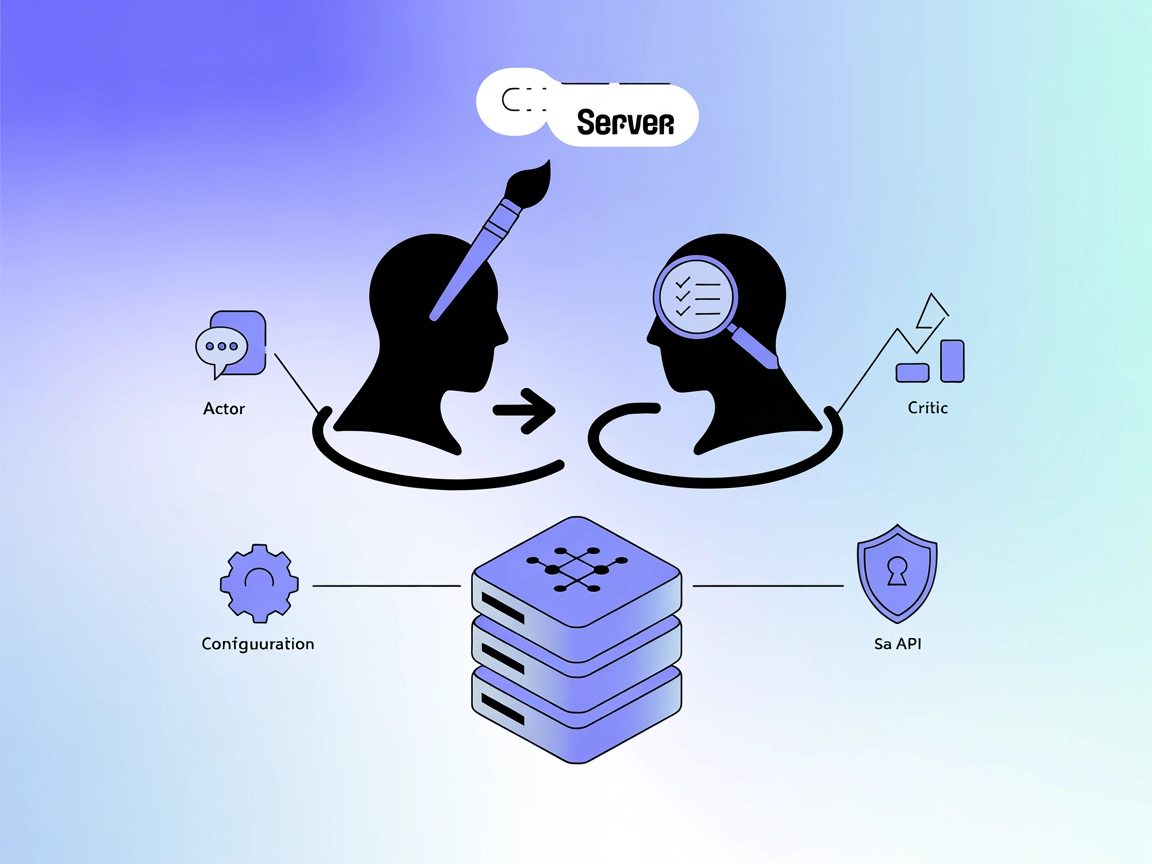
Actor-Critic Thinking MCP Server
Integrate FlowHunt’s Actor-Critic Thinking MCP Server to enable dual-perspective analysis for creative, strategic, and performance evaluations. Alternate betwee...

Enable AI-powered evaluations with both empathetic creator and objective critic perspectives, bridging intention and execution for improved outcomes.
FlowHunt provides an additional security layer between your internal systems and AI tools, giving you granular control over which tools are accessible from your MCP servers. MCP servers hosted in our infrastructure can be seamlessly integrated with FlowHunt's chatbot as well as popular AI platforms like ChatGPT, Claude, and various AI editors.
The Actor-Critic Thinking MCP Server is a dual-perspective analysis tool based on the Model Context Protocol (MCP). It enables AI assistants and clients to conduct comprehensive performance evaluations by alternating between the “actor” (creator or performer) and “critic” (analyzer or evaluator) roles. This approach allows for balanced assessments that combine empathetic understanding with objective analysis. The server supports nuanced, multi-dimensional evaluations and provides actionable feedback and improvement suggestions. By bridging intention and execution, it enhances development workflows, especially in scenarios where both subjective and objective criteria are important, such as creative reviews, performance assessments, and iterative refinement processes.
mcpServers section:{
"mcpServers": {
"actor-critic-thinking": {
"command": "npx",
"args": ["-y", "mcp-server-actor-critic-thinking"]
}
}
}
mcpServers key:{
"mcpServers": {
"actor-critic-thinking": {
"command": "npx",
"args": ["-y", "mcp-server-actor-critic-thinking"]
}
}
}
{
"mcpServers": {
"actor-critic-thinking": {
"command": "npx",
"args": ["-y", "mcp-server-actor-critic-thinking"]
}
}
}
{
"mcpServers": {
"actor-critic-thinking": {
"command": "npx",
"args": ["-y", "mcp-server-actor-critic-thinking"]
}
}
}
Securing API Keys
{
"mcpServers": {
"actor-critic-thinking": {
"command": "npx",
"args": ["-y", "mcp-server-actor-critic-thinking"],
"env": {
"API_KEY": "${API_KEY}"
},
"inputs": {
"apiKey": "${API_KEY}"
}
}
}
}
Using MCP in FlowHunt
To integrate MCP servers into your FlowHunt workflow, start by adding the MCP component to your flow and connecting it to your AI agent:

Click on the MCP component to open the configuration panel. In the system MCP configuration section, insert your MCP server details using this JSON format:
{
"actor-critic-thinking": {
"transport": "streamable_http",
"url": "https://yourmcpserver.example/pathtothemcp/url"
}
}
Once configured, the AI agent is now able to use this MCP as a tool with access to all its functions and capabilities. Remember to change “actor-critic-thinking” to whatever the actual name of your MCP server is and replace the URL with your own MCP server URL.
| Section | Availability | Details/Notes |
|---|---|---|
| Overview | ✅ | Dual-perspective MCP server leveraging actor-critic methodology |
| List of Prompts | ✅ | Actor, Critic, Round Tracking, Multi-dimensional Evaluation |
| List of Resources | ✅ | Guidelines, Parameters, Showcase, Improvement Suggestions |
| List of Tools | ✅ | Analysis Engine (actor/critic dual-perspective evaluation) |
| Securing API Keys | ✅ | Example provided using environment variables |
| Sampling Support (less important in evaluation) | ⛔ | Not mentioned in the repository |
Based on the tables, this MCP server provides solid documentation, clear prompts, and setup instructions. However, information on sampling and roots is not present, and the toolset is relatively focused. The repository is functional and well-structured, but the scope is specialized. Overall, I would rate this MCP server a 7/10 for usability, clarity, and directness, though broader extensibility is not visible from the repo.
| Has a LICENSE | ✅ (MIT) |
|---|---|
| Has at least one tool | ✅ |
| Number of Forks | 3 |
| Number of Stars | 9 |
It's a dual-perspective Model Context Protocol server that alternates between 'actor' (creator) and 'critic' (evaluator) roles, enabling nuanced and balanced performance evaluations with actionable feedback.
The server provides Actor Perspective, Critic Perspective, Round Tracking, and Multi-dimensional Evaluation prompts to guide the evaluation process and maintain context.
By combining empathetic self-reflection with critical analysis, it bridges the gap between intention and execution—vital for creative reviews, performance assessments, and iterative development.
Instructions are provided for Windsurf, Claude, Cursor, and Cline platforms. Each involves editing the configuration file to include the MCP server details, then restarting the platform.
Store sensitive API keys in environment variables and reference them in your configuration under the `env` and `inputs` fields for the MCP server entry.
Evaluating artistic performances, gap analysis, constructive feedback, complex scenario review, and performance reviews—any context where both subjective and objective assessments are needed.
Integrate the Actor-Critic Thinking MCP Server into your FlowHunt workflow to enhance your team’s feedback processes and performance reviews.

Integrate FlowHunt’s Actor-Critic Thinking MCP Server to enable dual-perspective analysis for creative, strategic, and performance evaluations. Alternate betwee...

The Model Context Protocol (MCP) Server bridges AI assistants with external data sources, APIs, and services, enabling streamlined integration of complex workfl...

Think MCP Server provides a structured reasoning tool for agentic AI workflows, enabling explicit thought logging, policy compliance, sequential decision-making...
Cookie Consent
We use cookies to enhance your browsing experience and analyze our traffic. See our privacy policy.